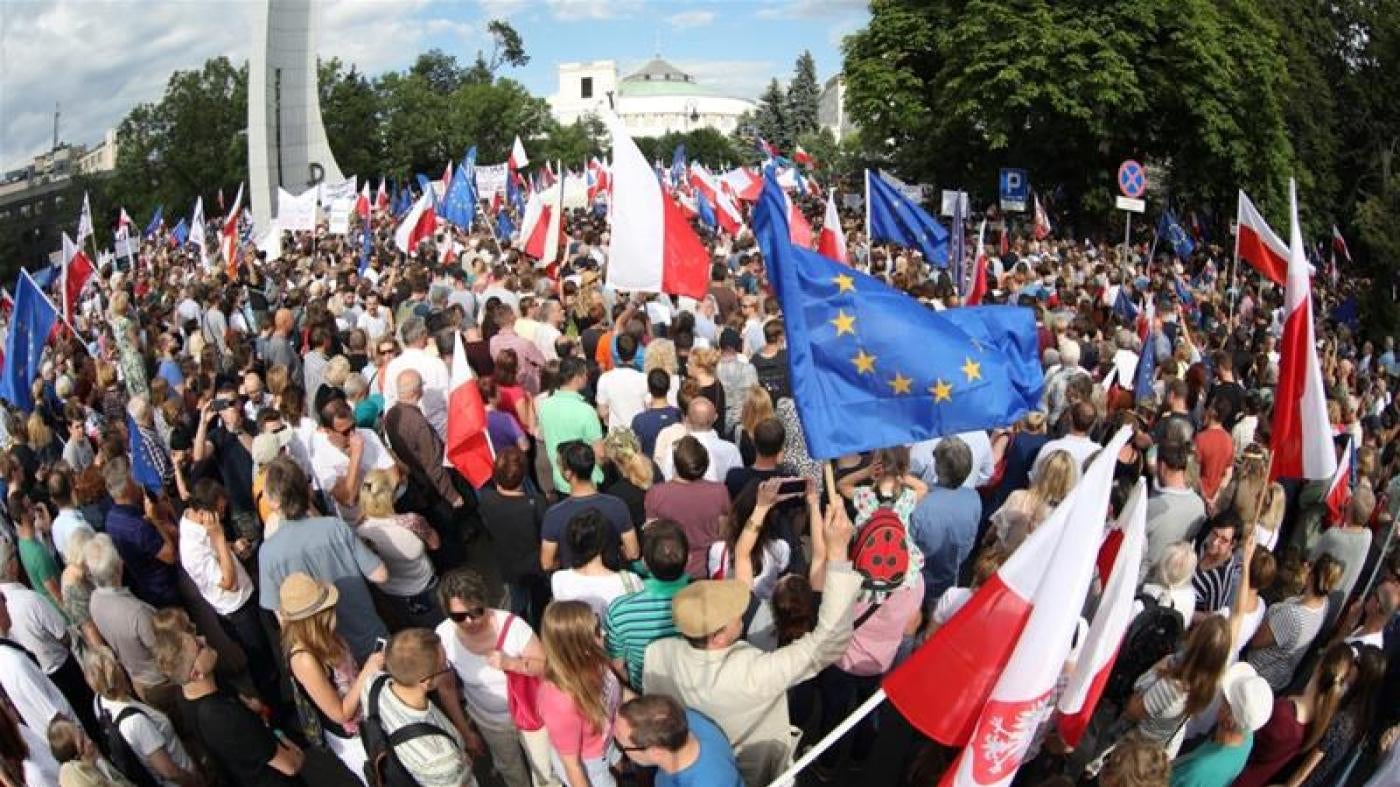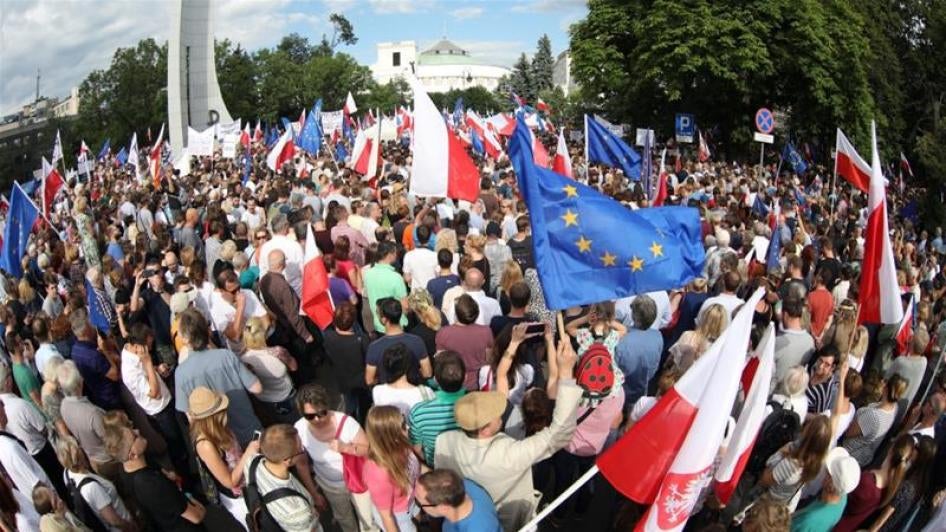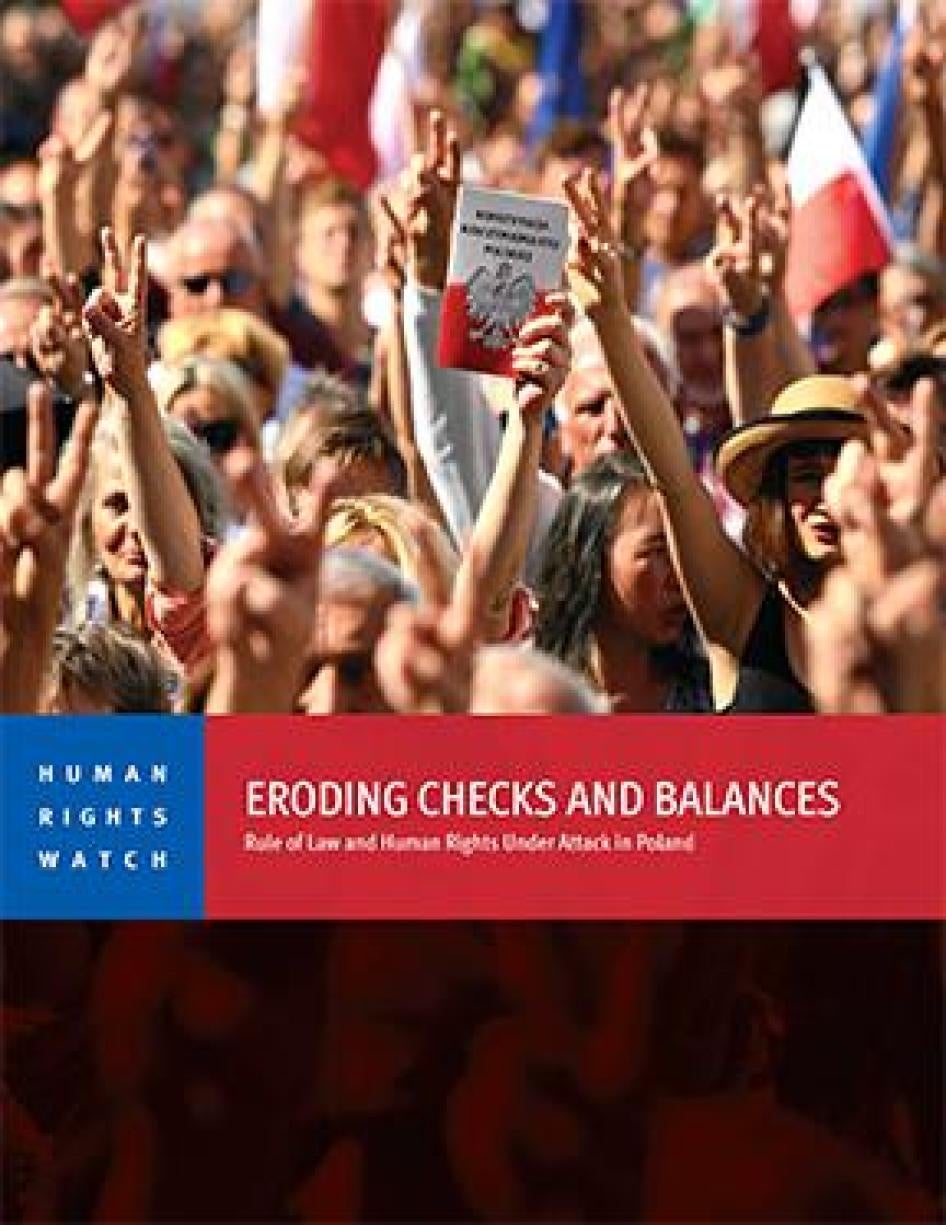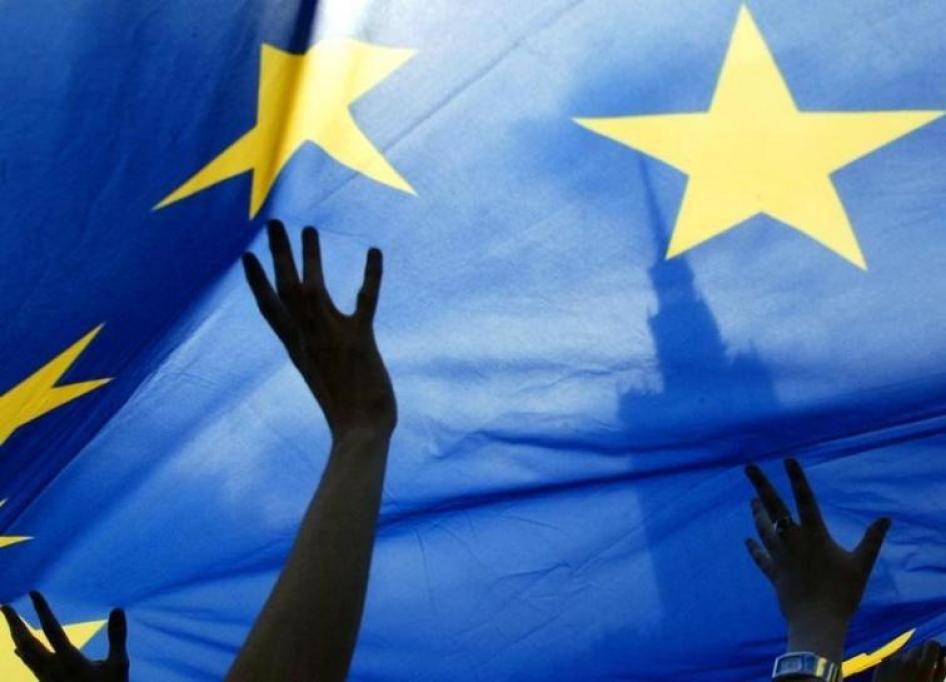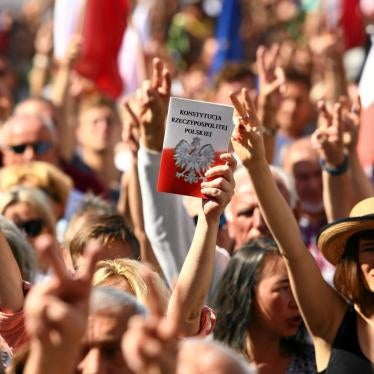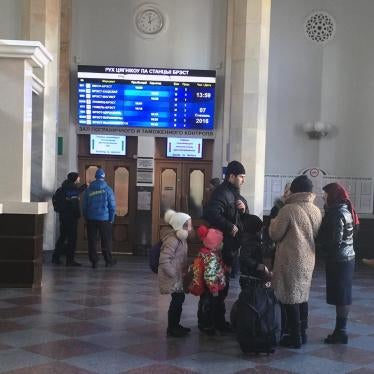Over the past two years, Poland’s government has tightened its control over the courts, the media, and domestic rights groups. Thousands of outraged citizens have staged protests nationwide against these moves, even successfully pressuring the government to withdraw some laws that would have further restricted rights. Philippa Stewart speaks to Europe researcher Lydia Gall about what is happening in the country, and what needs to be done.
What is happening in Poland right now?
We have a situation where the government has essentially engaged in a power grab. It is seeking to put everything that might be a threat to its power under its control.
That includes the courts, ombudsmen, even the people out demonstrating or the media reporting on all this – indeed, any institution or entity that seeks to be critical. The shape or form the criticism takes doesn’t matter, the government is seeking ways to stop or limit it. Ultimately, they are trying to restrict the flow of critical opinions or information by locking down the very institutions democratic countries put in place to act as checks and balances on the government and to protect the people.
If it keeps going this way, we could have a situation where the government is in full control, where no critical voices would be allowed. That is the worst-case scenario for Poland’s future.
Why is that?
There are several institutions, such as the courts and media, whose role is not to serve the government of the day, but to act independently so they can protect people from government overreach or abuse. But when their independence is completely undermined by government policies, who’s left to protect you?
This government has taken their democratic mandate and misused it to stifle democratic voices.
Why should this matter to normal people in Poland?
When the going is good the whole concept of “rule of law” and “checks and balances” is not something that people walk around thinking about every day. It’s when the going gets tough that that people suddenly wake up and ask questions. The Polish people have been doing this, but it’s more important than ever now.
If you have an abusive boss or you’re the victim of a crime and you want to go to the authorities for help or protection, you want to be able to trust those authorities to treat your problem fairly. You can’t count on the courts’ objectivity and independence if they are controlled by the government, you can’t really trust the media if the messages are being controlled by the government, and you can’t trust other institutions to work to protect your rights as a resident of that country.
Losing the guarantee of a fair hearing because the courts are being controlled politically could affect you on a lot of different levels, such as if you are accused of a crime, or if your home is subject of compulsory purchase by the state. If it’s up to the good will of individual judges whether or not you get a fair hearing then that’s a problem. A fair hearing isn’t something that should be left to chance.
A new law allows common court judges to be dismissed without any reason, not by their peers but by the president and so you have these arrangements that are problematic, that you might not feel personally as a citizen of Poland right at this moment but that may have some very serious implications for you if you ever need the justice system to protect your rights.
Other than the courts, what is being restricted in Poland?
The media are also being intimidated through various legislative measures to make it easier to punish those who may write or report critically on the government. That affects the public as well. Now, information might be compromised or censored.
As a journalist, you might be inclined to write what the government wants just to put food on the table for your family. It has quite severe implications for the information flow when critical voices are losing their jobs.
There’s also a clampdown on civil society – groups working on issues like women’s rights, or asylum. The government just adopted a law that basically centralizes all public funding – money these groups depend on – in an effort to obstruct and restrict the work they are doing.
That is a sweeping range of issues.
Yes, and there are also specific communities whose rights are being compromised. For example, women’s and girls’ reproductive rights are threatened with further restrictions in a country that already has some of the most restrictive abortion rules in Europe.
Then you also have an issue with how the government is treating asylum seekers. Asylum seekers are summarily returned from the Polish border to Belarus, a country where they are not safe, and a country where they might risk being returned to their countries of origin, where they are certainly not safe.
Third, the new counterterrorism legislation has a very broad and vague definition of terrorist crimes and allows for arbitrary surveillance on very vague grounds, and lengthy pretrial detention before formally charging suspects. It also allows authorities to shut down websites on arbitrary grounds.
It might seem quite abstract to people on the street, but the Constitutional Tribunal – basically the highest court in the country, which monitors whether the laws passed by the government are in line with the constitution – has basically been paralyzed for the past two years. This means that laws being adopted that violate constitutional principles can’t be struck down because the government is refusing to accept the rulings from the Tribunal.
What can people in Poland do?
People have taken to the streets and they do protest these measures, which is good. It has, on occasion, made the government budge on issues. Mass protests helped stop the government from further restricting Poland’s abortion law, and nationwide protests pressured Poland’s president to veto controversial laws undermining the independence to the judiciary.
It is more important than ever now for people to speak out because the very right to take to the streets is under threat and has been restricted by the government. Clearly there is a reason why the government is doing it, they are not keen on thousands of people taking to the streets. Protest is working so they have introduced laws that make it more difficult to protest.
How has the situation been allowed to reach this stage?
That this is going on in an EU member state may be troubling, but sadly not surprising. We have a similar situation in Hungary that started seven years ago. The EU’s failure to impose any consequences on Hungary for rolling back rights sent a message to Poland that if Hungary got away with it, they can – get away with it too – and they are.
What can be done?
The European Commission can take action against a member state in which there is a systemic threat to the rule of law. It is doing finally taking action – for the first time – against Poland. The first step was creating a “dialogue,” which has been under way for almost two years. In short, the commission is saying, “These are the things the Polish government needs to do,” but the Polish government has basically ignored all recommendations. The next stage is to trigger proceedings that can ultimately lead to the member state being deprived of its voting rights at the council level.
Poland also receives more EU funding per capita than most other EU countries. These funds should only be given to Poland if its government meets certain conditions. If the European Commission doesn’t get serious about holding the Polish government to account for backtracking on rights, the risk is that other EU member states will be tempted to follow a similar path. That would put the credibility of the EU as a whole into question.
This interview has been edited and condensed.
